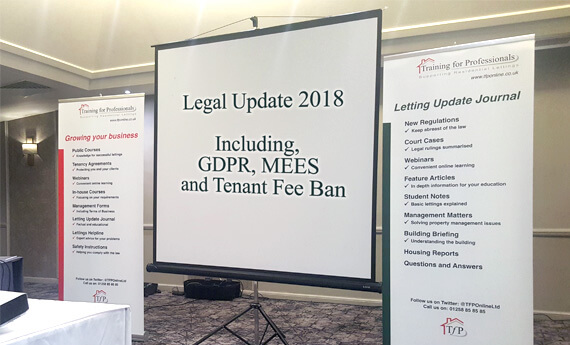This week I was fortunate enough to have a front row seat at the Legal Update 2018 seminar which covered GDPR, MEES and the Tenant Fee ban.

It would be an impossible task for me to reproduce the 6 hours of valuable letting update information delivered by Training for Professionals into a single article. Therefore, I’ll do my best to summarise what I believe to be the most salient points of each subsection which may affect you – our private landlord.
GDPR – General Data Protection Regulations
The new European legislative regulations GDPR come into force on May 25th, 2018 which affects any business or person collecting, storing or processing data containing personally identifiable information such as name, telephone number, email, passport, NI etc.
In the interest of our clients, I sought to clarify with the Information Commission Office whether it would form part of a landlord responsibilities to be registered with the ICO as they are technically under the terminology of ‘data processor’, processing tenant data.
After 37 minutes on hold, I was passed through to the registrations team who I quote “Have taken a number of calls about GDPR for landlords over the last few weeks”. They advised me that if a landlord is processing tenant data (for example: carrying out referencing, creating tenancy agreements, arranging check-ins etc) then they would be required to register. This is currently an annual fee of £35.
The underlying tone I picked up from the call was that it is unlikely they will seek to impose fines of up to 20 million euros on small businesses and sole traders as highlighted in the GDPR guidelines.
However, if you are processing or controlling data, you should carry out an audit and determine under what ‘lawful basis of processing’ you are handling data just to be on the safe side.
Tenant Fee Ban
The tenant fee ban was announced in the autumn budget of 2016 claiming it sought to save tenants £4.3 million in unnecessary fees.
Likely prompted by the actions of a minority of agents charging extortionate admin and referencing fees. We’ve heard of some cases where agents have been charging tenants in excess of a month’s rent in areas of London.
In November last year, the draft tenant fee ban bill was released which contains 27 sections and 3 schedules dealing with tenant fees, deposits and holding deposits. This proposal affects private landlords as well as letting agents.
Tenant Fees
The landlord or agent may not require the tenant to pay a ‘prohibited payment’ as a condition to the granting of a new, continuation or renewal of a tenancy agreement.
The most common example of a prohibited payment would be requiring the tenant to pay a referencing fee in order to be considered for the tenancy. Other such examples may include the cost of drafting inventories, check-ins or inspections.
Fees that are permitted include rent, deposits, holding deposits and default fees (i.e. charging the tenant for surrendering the agreement early if consent is given by the landlord).
Deposits
Deposits are considered a permitted payment however; the proposal suggests that deposits should be capped to 6 weeks rent. The statutory calculation must be the annual rent divided by 52 X 6.
Deposits will continue to be registered in line with deposit scheme regulations.
Holding Deposits
If a landlord is to seek a holding deposit whilst the tenant undergoes referencing, the maximum amount is capped to one weeks’ rent and the same statutory calculation must be applied.
Note that a new terminology has been introduced called “deadline for agreement”. This means that the landlord or agent will have 15 days to enter into an agreement and if they don’t, the holding deposit must be returned to the tenant. The caveat is that the parties can extend the 15 days if agreed in writing prior!
If they do enter an agreement, the holding deposit must either be returned or used as deposit or part payment of rent.
MEES – Minimum Energy Efficiency Standards
We’ve covered the changes to Energy efficiency standards in previous articles. As a reminder, there are 2 dates you need to be mindful of which are:
From the 1st April 2018, a landlord in England will not be able to grant a new assured shorthold tenancy (including tenancies that roll into periodic tenancies) if the property being let displays a Band F or Band G on the Energy Performance Certificate (EPC) – unless it is registered as exempt.
Where a landlord believes that an F or G EPC rated property they rent qualifies for an exemption from the minimum energy efficiency standard, an exemption must be registered on the National PRS Exemptions Register. The register service is currently running as a pilot. Landlords who wish to register an exemption for a domestic or non-domestic property as part of this pilot should e-mail the BEIS minimum standards team at [email protected]
From 1st April 2020, the above applies to all tenancies, including existing tenancies.
Here to help private landlords
Needless to say, that the Private Rented Sector is continuously shifting in terms of legislative updates including landlord registration requirements, selective licensing and property regulations and the responsibilities of landlords and agents are ever changing.
We believe this is the reason why many private landlords are choosing to use a service like ours as we:
- Keep landlords costs to a minimum
- Enable the landlord to keep control of the relationship with their tenant and most importantly,
- We help to ensure that our landlords operate their lettings business within the boundaries of the law
If you are interested to learn how we can help you and your lettings and guarantee to pay your rent on time, please do get in touch with the landlord team on 0333 577 8888 and we’ll be happy to discuss our letting packages.
Thanks again for reading,
Jonathan Daines
Founder, LettingaProperty.com


